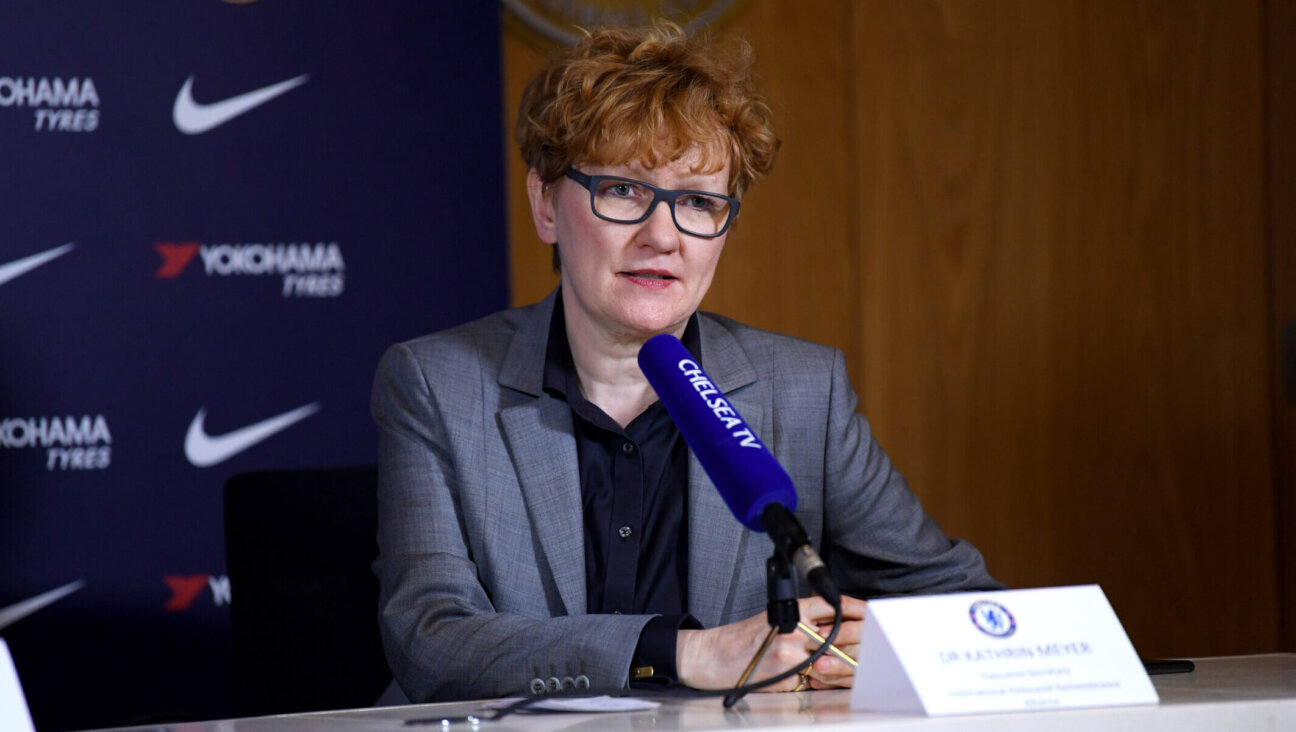Cuba’s Remnant Rediscovers Religion

A ?Juban? Purim: A young woman dressesd as Vashti goes to a reading of the Book of Esther. Image by Michael Orbach
The hubbub surrounding Cuba’s small Jewish community these days does not faze Yakob Berezniak Hernandez.
Sitting behind a desk crowded with a typewriter, several cans of Lieber’s tomato paste and piles of loose foreign change, Hernandez, of Havana’s Adath Israel synagogue, waved away inquiries about Alan Gross, the 61-year-old American Jewish contractor sentenced to 15 years in prison March 15. Gross was found guilty of seeking to clandestinely distribute Internet satellite communications equipment to Cuba’s Jewish community on behalf of United States Agency for International Development.
“We have good relationships with the goyim,” said Hernandez. “This is a paradise for religions. You can’t find anti-Semites [here]. No one cares.”
But several days later, it became clear that some people outside Cuba care a lot. When former President Jimmy Carter arrived in Cuba on March 28, he met almost immediately with Jewish community leaders, followed by meetings over the next two days with senior Cuban officials, including President Raul Castro. ABC News reported that the Gross case was a prominent part of his discussions with the Cuban officials.
The Gross case also shined a spotlight on the small Cuban-Jewish community or “Jubans,” as they are known. While close to 95% of the Jewish population fled Cuba before or soon after the revolution, a remnant remained. Now numbering a little more than 1,000, the community has experienced a religious reawakening.
These days, 200 people or more pray every Sabbath in the El Patronato Bet Sholom Synagogue, the largest in Cuba, and close to 100 teenagers attend Sunday school, where they learn Hebrew and study about Judaism.
Adath Israel, located in the old Havana district, is the sole Orthodox synagogue in Cuba. Hernandez, a hulking, bearded 29-year-old, fulfills many roles in the congregation. He is the synagogue’s cantor, public prayer reader, one-man burial committee and treasurer. After spending four months in Haifa in 2009 studying the laws of kashrut, he also became the community’s sole shokhet, or ritual slaughterer, a task he fulfills five blocks away, in a butcher shop. (Meat, a luxury in Cuba, is regularly provided to members of the Jewish community under the national rationing system, instead of the pork rations others receive.)
Outside Hernandez’s office, women knitted yarmulkes with Israeli and Cuban flags intertwined, which they sold to tourists for roughly $10, a little less than a month’s salary for most Cubans.
While Israel and Cuba do not have formal diplomatic ties, Cuban Jews can make aliyah and leave the country, unlike their fellow citizens. Many Jews have immigrated to Israel, though Hernandez said that some have had trouble adjusting. “It’s difficult to adapt to life in Israel,” Hernandez said, citing the relaxed atmosphere of Cuba. “People that stay are very happy. It’s a place to practice Judaism.”
The Orthodox Adath Israel, which holds daily morning and afternoon-evening services, found a novel way to attract people in this country of scarcities to its gatherings: food. The synagogue provides a meal after both shacharit, the morning service, and mincha, the afternoon service.
Hernandez said that the congregation numbers 300 members, many of whom he claims keep kosher thanks to donations from the Jewish community of Panama. The synagogue bakes challah in its own kitchen; for Purim, Adath Israel baked hamantaschen. A new van, with the name and logo of the synagogue’s website, was parked outside — a strange sight in Havana, where bicycle taxis and refurbished 1950s Chevrolets and DeSotos crowd the dusty streets. This relative wealth didn’t stop members of the community from offering to sell cigars to a reporter.
Ruth Behar, a professor of anthropology at the University of Michigan and the author of “An Island Called Home: Returning to Jewish Cuba,” said that the community is composed mainly of converts.
“There’s a handful of Jews on both their mother and father’s side,” she said. “Most have converted because their father is Jewish or they have a grandparent. They’re very much a larger part of Cuban society.”
Outside Adath Israel, Bryam Ernesto Quirch Acosta, 21, an engineering student at the University of Havana whose grandfather was Jewish, explained why he came to the synagogue. “I feel sorry,” he said in Spanish. “I don’t know how to be Jewish.”
The community’s makeup has caused some problems for Lubavitch, the Hasidic sect famed for its worldwide outreach. The Orthodox synagogue broke ties with the group recently.
“They make propaganda against the Jews and the goyim,” Hernandez said, explaining the break.
Shimon Aisenbach of the Chabad Canadian Friends of Cuban Jewry said that the falling-out was caused when the synagogue’s old president left. Lubavitch emissaries, according to Aisenbach, were told that the synagogue no longer believed in the Orthodox definition of someone who is Jewish, which requires matrilineal descent.
“They proved it clearly to our emissaries by allowing an outright non-Jew to blow the shofar on that Rosh Hashanah,” he explained in an email to the Forward.
Hernandez said that the synagogue is strictly Orthodox and does not do conversions, though it does allow those who have converted in the Patronato synagogue to take part in its services.
For most Cubans, though, conversions and intermarriages seem a part of life. Rosa Behar (no relation to the anthropologist), a prominent, retired gastroenterologist who runs a free pharmacy for the Jewish community and serves as president of the Cuban chapter of Hadassah, called them the “most beautiful thing” about the Jewish community.
“They come because life is better,” she said, referring to the many assimilated Cubans with some Jewish ancestry who flock to synagogue services.
Cuba’s hostile foreign policy toward Israel is largely typical of leftist governments worldwide. But there are low-profile chinks in the public stance. In 1992, Rafi Eitan, a former senior Mossad operative and current Israeli Cabinet minister, founded a company that owns several large citrus cooperatives in the country. He markets the cooperative’s fruits in Israel. Eitan, who was implicated in Jonathan Pollard’s Washington espionage scandal in the 1980s, has a personal relationship with Fidel Castro through his company. In 2006, Eitan joined Castro to inaugurate Havana’s Holocaust memorial monument — a large seven-branch menorah in a central city square.
“The Cuban government doesn’t like the Israeli government and their attitude toward the Palestinians, but they actually love Jewish people and appreciate the Jews,” Ruth Behar said.
Arturo Lopez-Levy, a lecturer at the Josef Korbel School of International Studies at the University of Denver who lived in Cuba until 2001, said he believed that Gross was an unwitting instrument of the old U.S. policy of regime change dressed as Jewish solidarity. At Gross’s closed trial, Lopez-Levy related, citing accounts he heard from Cuba, a Jewish communal leader testified that Gross, who entered on a tourist visa, had never informed the Jewish communal official he was working on behalf of USAID. The Cuban government views USAID’s Cuba programs, funded under Congress’ Helms-Burton Act imposing sanctions on their country, as part of a U.S. effort to undermine the regime.
“It is legitimate to promote human rights, legitimate to promote religious freedom, legitimate to promote communications with Cuban citizens [to] the outside world,” said Lopez-Levy, who strongly supports Gross’s release. “What is not legitimate is to do so as an agent of a government that seeks to undermine the regime without the informed consent of the community.”
Contact Michael Orbach at [email protected]
A message from our Publisher & CEO Rachel Fishman Feddersen

I hope you appreciated this article. Before you go, I’d like to ask you to please support the Forward’s award-winning, nonprofit journalism so that we can be prepared for whatever news 2025 brings.
At a time when other newsrooms are closing or cutting back, the Forward has removed its paywall and invested additional resources to report on the ground from Israel and around the U.S. on the impact of the war, rising antisemitism and polarized discourse.
Readers like you make it all possible. Support our work by becoming a Forward Member and connect with our journalism and your community.
— Rachel Fishman Feddersen, Publisher and CEO























